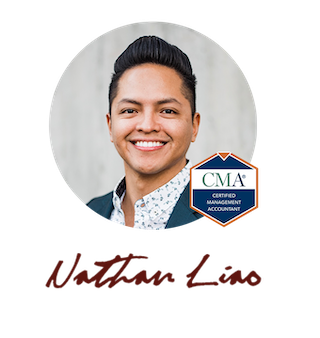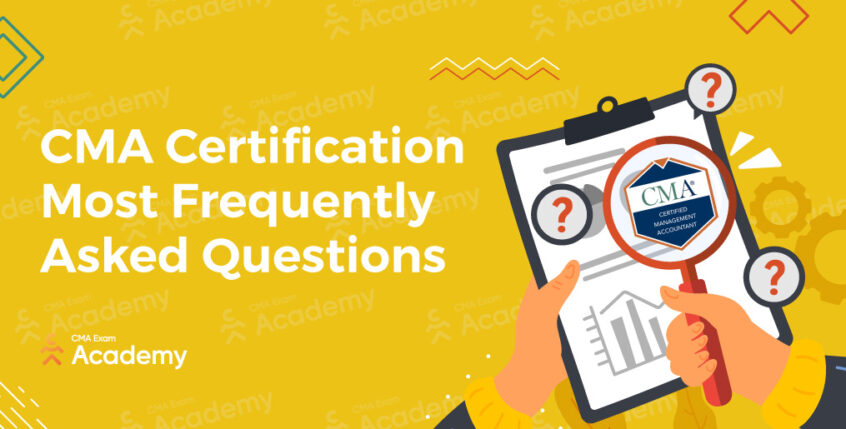It’s no secret that the CMA exam is challenging. Preparing for it, studying, and fulfilling all the necessary requirements is a long, arduous process, and many people have reservations about the time and cost involved. That’s fair!
However, I know that it’s worth it! The CMA certification can open doors to more senior positions, higher salaries, and greater career satisfaction.
How do I know?
I earned my CMA in 2012, and in the years since, I’ve helped thousands of people do the same. In that time, I’ve been asked many of the same questions.
I’m always happy to answer any questions, and to make those answers even easier to access, I’ve compiled them below into one long CMA FAQ post.
Please scroll through for the answers—if there’s something I missed, leave a comment at the end, and I’ll be sure to respond.
Let’s get into these FAQs for CMA candidates.
-
- How long does it take to complete a CMA course?
- What is the success rate of CMA Exam Academy students?
- Are there any prerequisites for the CMA?
- Am I too old for the CMA if I’m over 40+?
- What are the benefits of becoming a CMA?
- How should I prepare for the CMA exam?
- What are the continuing education requirements for CMAs?
- How much can I earn in annual salary after I get the CMA?
- Can I retake the CMA exam if I don’t pass?
- What’s the total investment needed to obtain the CMA?
- Can I open my own firm as a CMA?
- What does a CMA need to do to stay relevant?
How long does it take to complete a CMA course?
The duration of a CMA course can vary, but with dedicated preparation, it’s possible to complete the certification process in just over eight months. I designed my accelerated 16-week CMA coaching program to help candidates pass both exam parts while balancing work and personal commitments.
However, the overall timeline to become a CMA can be longer when considering the full requirements. You’ll need an undergraduate degree and two years of professional experience. Preparation for the CMA exam itself often ranges from 8 to 12 months, depending on your schedule flexibility and study plan.
In total, becoming a CMA can take upwards of 3 years without factoring in the undergraduate degree.
What is the success rate of CMA Exam Academy students?
At CMA Exam Academy, we take pride in our students’ achievements. We have several case studies showcasing numerous success stories, with an impressive 92% pass rate among those who followed our structured study plan and utilized our resources effectively.
Here’s what one student had to say about her experience:
“CMA Exam Academy is the sole reason I am a CMA. I had previously purchased another program and found it so overwhelming, I gave up. The structure and pace provided by the Academy made it possible for me to master the material while working full-time. I also appreciated how responsive the team was to any questions I had. Thank you!”
-Stacey Baker, CMA
Are there any prerequisites for the CMA?
Yes, the CMA certification has specific prerequisites. Candidates must hold a bachelor’s degree (or equivalent professional certification) from an accredited institution, become a member of the Institute of Management Accountants (IMA), and meet the work experience requirements of two consecutive years in a relevant field, or four consecutive years in a part-time role.
Am I too old for the CMA if I’m over 40+?
Absolutely not! The CMA certification is valuable at any stage of your career. Many professionals pursue the CMA later in their careers to enhance their skills, advance to leadership roles, or transition into new industries.
Age is not a barrier. The key is your dedication and commitment to professional growth. I’ve had students in their 60s earn their CMA after completing our 16-week Accelerator program.
What are the benefits of becoming a CMA?
Earning the CMA certification has many benefits—it can significantly boost your career prospects and earning potential. Here are a few key advantages:
-
-
- Higher Earning Potential: CMAs consistently earn higher salaries compared to non-certified professionals. According to the IMA’s 2023 Salary Survey, the median annual salary for CMAs in the USA was $137,137, with total compensation reaching $163,932.
- Diverse Career Opportunities: Becoming a CMA opens doors to a wide range of career paths across many industries. CMAs are highly sought after for roles such as corporate accountants, accounting managers, financial strategists, chief financial officers, and corporate controllers. The versatile skill set allows CMAs to thrive in both private and public organizations, as well as non-profit entities and academic institutions.
- Global Recognition and Mobility: As a globally recognized certification, the CMA is respected and valued by employers worldwide. This international recognition provides CMAs with increased career mobility, enabling them to pursue opportunities across borders and work in different countries without facing significant barriers.
- Enhanced Credibility and Expertise: Earning your CMA demonstrates a commitment to professional excellence and a mastery of critical skills in areas such as financial analysis, risk management, strategic decision-making, and corporate governance. This expertise enhances a CMA’s credibility and positions them as trusted advisors to senior management and stakeholders.
-
How should I prepare for the CMA exam?
Structured preparation is critical for success on the CMA exam. I’ve compiled all of my essential study secrets into a single guide, including proven strategies and tips to help you study effectively, manage your time wisely, and approach the exam with confidence.
Utilizing a structured review course and practice materials can significantly improve your chances of passing on the first attempt.
What are the continuing education requirements for CMAs?
As with most professional certifications, CMAs need to earn continuing education hours each year.
To maintain their certification, CMAs must complete 30 hours of Continuing Professional Education (CPE) credits annually, with two of those hours dedicated to professional ethics. CPE hours are a great way to stay updated with current technology and new trends in the industry.
CPE Flow, a new platform offering engaging, entertaining video masterclasses, is a convenient and fun way to fulfill these requirements and ensure you stay up-to-date with the latest industry developments.
How much can I earn in annual salary after I get the CMA?
The CMA certification is highly valued in the job market, and certified professionals typically earn higher salaries than their non-certified counterparts. According to the latest salary survey, the median annual salary for CMAs in the USA is $137,137, with total compensation reaching $163,932.
However, earning potential can vary based on industry, location, and experience.
Can I retake the CMA exam if I don’t pass?
Yes, candidates who don’t pass the CMA exam on their first attempt can retake it as many times as needed, subject to the IMA’s policies and fees. Unfortunately, about half of all people who take the exam fail on their first attempt.
Because of this, I created a comprehensive guide on retaking the CMA exam. It’s full of valuable insights and strategies to improve your chances of success on subsequent attempts.
What’s the total investment needed to obtain the CMA?
The total investment needed to obtain the CMA certification includes the IMA membership fee, exam registration fees, study material costs, and potentially a review course. While costs can vary, my detailed breakdown of the CMA exam cost estimates the total investment to be around $2,000 to $3,000, which is worthwhile considering the long-term career benefits and earning potential.
Can I open my own firm as a CMA?
Absolutely! Becoming a CMA equips you with the knowledge and skills necessary to pursue various career paths, including starting your own accounting or consulting firm. Many CMAs have successfully established their own Fractional CFO businesses, leveraging their expertise in financial management, strategic planning, and business advisory services.
What does a CMA need to do to stay relevant?
To remain relevant in the ever-evolving management accounting field, CMAs might want to prioritize continuous learning and professional development. Staying up-to-date with industry trends, new technologies, and best practices through continuing education, networking groups, and active engagement in the CMA community is essential for career growth and adaptability.
CMA Exam Academy—Your Partner in Success
Ready to take the plunge and prepare for the CMA exam? The CMA Exam Academy 16-Week Accelerator Course includes structured guidance, expert instruction, and proven strategies to help you pass the CMA exam on your first attempt and unlock a world of career opportunities.
Let me know in the comments below if you have any additional questions.

Hi, I’m Nathan Liao (aka the CMA Coach)! For the last 10 years, over 82,000 accounting and finance pros came knocking at my door seeking guidance and help. If you’re also aiming to conquer the CMA exam on your very first try—without wasting away time or money—you’ve found your ultimate guide. Dive in deeper to discover more about me and the dedicated team that powers CMA Exam Academy. Click here and let’s embark on this journey together!


